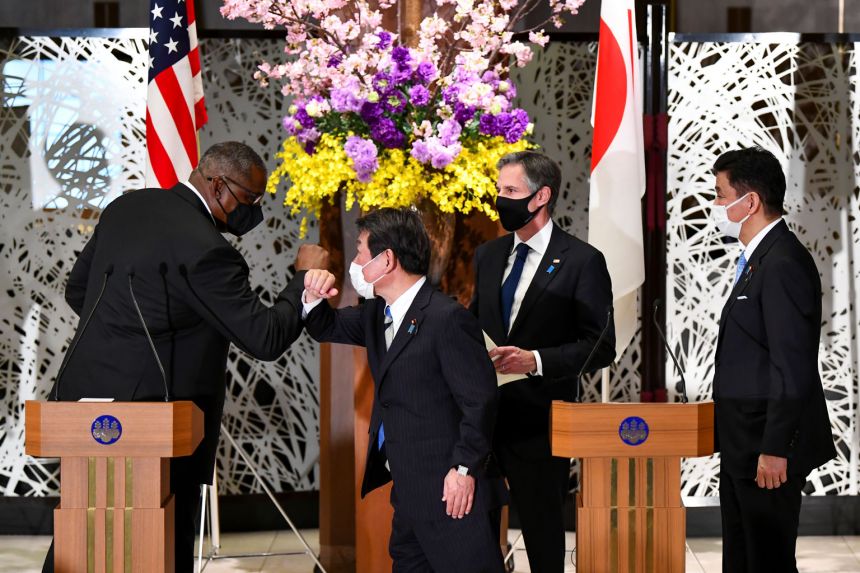US and Japan single out China as threat, vowing to 'push back if necessary'
Sign up now: Get insights on Asia's fast-moving developments

(From left) US Defence Secretary Lloyd Austin, Japan's Foreign Minister Toshimitsu Motegi, US Secretary of State Antony Blinken and Japan's Defence Minister Nobuo Kishi at a press conference in Tokyo, on March 16, 2021.
PHOTO: REUTERS
TOKYO - The United States and Japan singled out China on Tuesday (March 16) for its human rights transgressions and coercive, destabilising behaviour in the East and South China Seas, as well as the Taiwan Strait, as the two security allies vowed to be a bulwark for the rules-based international order.
US Secretary of State Antony Blinken and Secretary of Defence Lloyd Austin were in Japan for the first Cabinet-level overseas trip in US President Joe Biden's administration, in what they said was a showcase of their iron-clad alliance.
Japanese Prime Minister Yoshihide Suga, meanwhile, is set to be the first foreign leader to meet Mr Biden at the White House, in a trip slated for April 8 to 10.
On Tuesday's "two-plus-two meeting", the Americans and their Japanese counterparts, Foreign Minister Toshimitsu Motegi and Defence Minister Nobuo Kishi, said all actions were on the table - including nuclear - to protect Japanese sovereignty over the disputed Senkaku islets that China, which calls them the Diaoyu, also claims.
"China uses coercion and aggression to systematically erode autonomy in Hong Kong, undercut democracy in Taiwan, abuse human rights in Xinjiang and Tibet, and assert maritime claims in the South China Sea that violates international law," Mr Blinken said.
"We are united in the vision of a free and open Indo-Pacific region, where countries follow the rules, cooperate whenever they can, and resolve differences peacefully. In particular, we will push back if necessary when China uses coercion or aggression to get its way."
Mr Motegi added: "We agreed that China's behaviour is inconsistent with the existing international order, and poses various challenges to our alliance and the international community. "
He reiterated Tokyo's concerns over Beijing's new coast guard law that allows its patrol vessels to fire at foreign ships in disputed territory that it claims as its own.
Chinese ships have sailed near the Senkaku islands for 32 consecutive days as at Tuesday.
The ministers also stressed the importance of peace and stability in the Taiwan Strait, where Beijing conducted military drills in September. The waters separate Taiwan, seen as a renegade province by China, from the mainland.
Mr Austin stressed that the US' goal was to make sure it "maintains a competitive edge over China and anyone else that would want to threaten us and our alliance".
The visit by the US officials comes days after Mr Biden, Mr Suga, as well as Australian Prime Minister Scott Morrison and Indian Prime Minister Narendra Modi met virtually in the first-ever top-level summit for the Indo-Pacific grouping called the Quad, or formally, the Quadrilateral Security Dialogue.
The joint statement from that summit cited the need to "meet challenges to the rules-based maritime order in the East and South China Seas" without directly pointing the finger at China. Tuesday's joint statement, however, did.
Dr Tosh Minohara, chairman of the Research Institute for Indo-Pacific Affairs think-tank, told The Straits Times that while he hoped the strong message will serve as an effective deterrence to Chinese ambitions, Japan should also be more proactive in its defence.
"The American posture about engaging Japan shows Washington to not be the Washington that it once was," he said. "It's still the largest in relative terms but it is not the overarching presence it once was, and is more dependent on its allies."
Dr Satoru Nagao, a non-resident fellow of the Hudson Institute in the US, said that as US resources are also deployed in other parts of the world, it has not kept up with Chinese regional expansionism.
"This could be why the US has been asking Japan, Australia and India to take on more responsibilities against China," he said. He added that since Japan's Yonaguni island is only 108km east of Taiwan, Japan's interests are bound with Taiwan's.
Mr Austin and Mr Blinken will travel to Seoul today for talks with their counterparts. Mr Austin will then travel to India while Mr Blinken is set to meet top Chinese diplomat Yang Jiechi and Foreign Minister Wang Yi in Alaska on Thursday.


